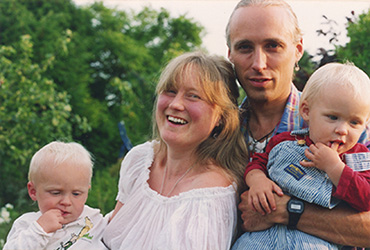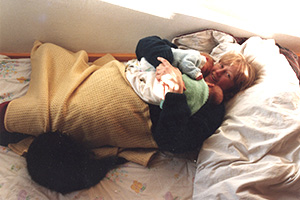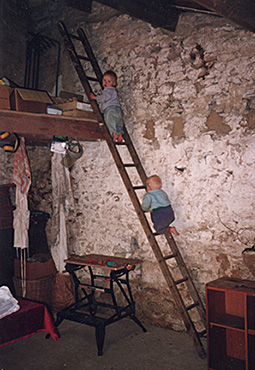Andrew J Green, writer
Articles > The principles and benefits of Attachment Parenting
The principles and benefits of Attachment Parenting
'Saving the world, one baby at a time'
 I, along with a growing group of parents worldwide, believe that the way we bring up our babies and children is a matter for careful consideration and questioning. We have been listening to what 'experts' say for far too long. If we mother or father our children automatically or 'instinctually', we often find we are unconsciously acting the same way that our parents did towards us. I believe that we need to literally get back 'in touch' with our children, both physically and emotionally, and re-learn natural parenting - 'attachment' parenting as it now tends to be called. Physical closeness to one's baby fosters emotional closeness and empathy such that, for example, I don't think they can be 'spoilt' if we go to them when they cry (just as we would never leave an adult to cry alone).
I, along with a growing group of parents worldwide, believe that the way we bring up our babies and children is a matter for careful consideration and questioning. We have been listening to what 'experts' say for far too long. If we mother or father our children automatically or 'instinctually', we often find we are unconsciously acting the same way that our parents did towards us. I believe that we need to literally get back 'in touch' with our children, both physically and emotionally, and re-learn natural parenting - 'attachment' parenting as it now tends to be called. Physical closeness to one's baby fosters emotional closeness and empathy such that, for example, I don't think they can be 'spoilt' if we go to them when they cry (just as we would never leave an adult to cry alone).
Babies are born in a very immature developmental state. Their needs are essentially the same as they were in the hunting and gathering stage of our existence. It is almost as if we became civilised and they have not. They need a responsive mother who is there to answer their needs day and night.
Carrying
 It is helpful to look to contemporary hunting and gathering cultures and to the way they nurture their children. By carrying the baby from birth, parenting can actually be made simpler and can essentially be a 'non-activity'. If the baby is carried from birth - as attachment parenting ideas suggest - there is no need to set aside special time, except for nappy changing. The baby is there with you whatever you are doing. Stillness is the most alien state to the newborn infant. Babies in cultures where they are constantly carried rarely, if ever, cry. We are, after all, a 'carrier' species. Mammals that nest their young produce high fat and protein milk and feed them at widely spaced intervals, whereas humans, like other primates, have the milk composition and sucking characteristics of a 'carrier' species.
It is helpful to look to contemporary hunting and gathering cultures and to the way they nurture their children. By carrying the baby from birth, parenting can actually be made simpler and can essentially be a 'non-activity'. If the baby is carried from birth - as attachment parenting ideas suggest - there is no need to set aside special time, except for nappy changing. The baby is there with you whatever you are doing. Stillness is the most alien state to the newborn infant. Babies in cultures where they are constantly carried rarely, if ever, cry. We are, after all, a 'carrier' species. Mammals that nest their young produce high fat and protein milk and feed them at widely spaced intervals, whereas humans, like other primates, have the milk composition and sucking characteristics of a 'carrier' species.
Co-sleeping/Bedsharing
 A baby needs its mother even more during the night than during the day, when its primary sense, sight, is at rest. It is also beneficial for fathers out at work to have that prolonged contact at night and if the mother is breastfeeding he will not be disturbed at all. If the mother can learn to go back to sleep while the baby feeds, her sleep will also be uninterrupted.
A baby needs its mother even more during the night than during the day, when its primary sense, sight, is at rest. It is also beneficial for fathers out at work to have that prolonged contact at night and if the mother is breastfeeding he will not be disturbed at all. If the mother can learn to go back to sleep while the baby feeds, her sleep will also be uninterrupted.
Trusting your child
I believe that children are innately social and will behave the way that is expected of them. We tend to deny their signals and finely tuned self-protective instincts, and to interfere with their inherent capabilities. For example, our children very quickly learned how to climb down stairs (and up and down ladders, before they could walk!) and were very careful and considered as they did so.
 However if continually cautioned with “careful, you'll fall”, they lose confidence and begin to assume that their parents expect them to fall – an expectation with which they will eventually comply. They don't need to be protected from fires because they can feel they are hot, just as we can, and can trust that feeling.
However if continually cautioned with “careful, you'll fall”, they lose confidence and begin to assume that their parents expect them to fall – an expectation with which they will eventually comply. They don't need to be protected from fires because they can feel they are hot, just as we can, and can trust that feeling.
Self-worth and security
If we really respect and empathise with our children, if we allow them to explore the world at their own pace, unhindered and unclouded by our adult perceptions of what is suitable or not, if we acknowledge their feelings no matter how difficult, they will in turn respect themselves and others. They can become capable, healthy, independent adults with a permanent and indomitable sense of their own worth.Confidence
When we become the allies of our children, they will work with us and respect the boundaries given them. By embracing this message, and replacing destructive child-rearing practices with those that meet our children's innate expectations, we will be surprised how easy and pleasant parenting can be. Later on, we will be living with young adults who feel confident, worthy and welcome in the world.Saving the world, one baby at a time!
As the late educator John Holt wrote:
Adttachment parenting - Some further reading
'The Continuum Concept' by Jean Liedloff
'Three in a Bed' by Deborah Jackson
'Magical Child' by Joseph Chilton Pearce
'The Politics of Breastfeeding' by Gabrielle Palmer
'Primal Health' by Michel Odent
'How to talk so kids will listen and listen so kids will talk' by A Faber & E Mazlich
'For Your Own Good' and others by Alice Miller
'Learning All The Time' and others by John Holt
'Liberated Parents, Liberated Children' by A Faber & E Mazlich
'Siblings Without Rivalry' by A Faber & E Mazlich
© Andrew Green, June 2014